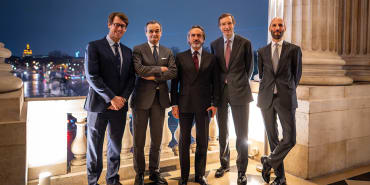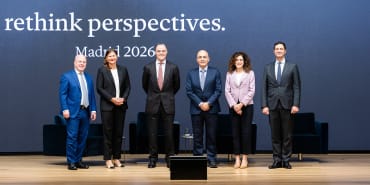Clearwater is a leading independent M&A advisory firm, working with mid-market businesses across Europe and the US. Known for its sector depth and entrepreneurial culture, the firm helps founders and families navigate complex transactions with clarity and conviction.
In this conversation, managing partner Marcus Archer shares his perspective on building trust with entrepreneurs, scaling without losing culture, and guiding businesses through today’s volatile dealmaking environment.
You started your career in accountancy, then spent several years in corporate finance at KPMG before joining Clearwater. How did that journey unfold?
I read economics at Bristol and, after a year of travel, followed my father’s advice to “get a proper job.” Accountancy gave me discipline and financial literacy, but I always knew I wanted to work closer to entrepreneurs. When I moved into KPMG’s corporate finance practice, I found that blend of numbers and narrative fascinating – helping founders articulate ambition in financial form.
I spent eight years there, building a support services sector team and learning the rhythm of transactions. But large firms have limits: layers of approval, little true ownership. Clearwater approached me in late 2007, and the difference was immediate. It was independent, partner-owned, entrepreneurial – people who had chosen to be together rather than being assigned by hierarchy. I joined in April 2008, right as the financial crisis hit. Trial by fire, perhaps, but it taught me what resilience really means.
What was it like joining during the 2008 crash?
Extraordinary timing. Banks were collapsing, confidence evaporated, and yet Clearwater stayed visible. We kept meeting founders – not to pitch, but to listen. That period forged long-term trust. When the market reopened, those relationships converted into mandates. It was a baptism of fire that reinforced what we still believe today: consistent presence beats opportunistic selling.
The guiding idea is continuity: meet entrepreneurs early, help them prepare, then execute the right option – be it fundraising, MBO, or sale – at the right time
Clearwater has expanded significantly since then. How do you keep the culture intact?
Very deliberately. When I joined, you could call every office and know every name. Now we’re over 140 in the UK and nearly 500 across Europe. Growth can dilute identity if it’s not intentional. Our board sets a clear direction: invest where demand is strong and where our independence adds value – not just where a map looks blank.
related content.

our private banking expertise in the uk.
learn more We’ve built depth in sectors – industrial, financial services, tech – and opened or strengthened offices like Leeds. We’ve expanded debt advisory, and recently re-energised the small-cap practice to stay close to founder-led businesses. The guiding idea is continuity: meet entrepreneurs early, help them prepare, then execute the right option – be it fundraising, MBO, or sale – at the right time.
Read also: Lombard Odier shifts focus to challenged UK entrepreneurs
You often emphasise the partnership model. Why does it matter so much?
Because ownership changes behaviour. As partners, we think like entrepreneurs; we manage risk, invest personally and take long-term decisions. There’s no quarterly reporting to a parent company. That autonomy makes us faster, but it also creates accountability to each other.
Rather than box-ticking, we treat sustainability as value creation: how a company interacts with its ecosystem – employees, suppliers, community – ultimately drives valuation
It also shapes how we invest internally. For instance, we built a modelling team of nearly 10 people – rare for a mid-market advisor. It gives clients data integrity and helps us deliver investor-grade analysis from day one. Another example is our ESG and impact practice. Rather than box-ticking, we treat sustainability as value creation: how a company interacts with its ecosystem – employees, suppliers, community – ultimately drives valuation.
related content.

entrepreneurs: bespoke wealth management.
learn more The ESG debate has cooled, especially in the US. What’s your reading?
Some of the political heat has gone out of it, yes, but the substance remains. Many corporates have quietly doubled down. In Europe, regulation ensures environmental and governance standards keep advancing; investors still ask hard questions.
Our stance is pragmatic: ESG only matters if it improves resilience and reputation. The ‘S’ has sometimes been the hardest – diversity, inclusion – but we see it as business logic, not ideology. Diverse teams challenge each other better, connect with a wider client base and simply perform better.
How is technology – particularly AI – changing the advisory business?
We’re pragmatic optimists. AI will transform workflows, but it shouldn’t replace judgement. We’ve launched our own digital transformation programme to raise productivity by roughly 50 percent within the same cost base. That means automating data tasks – research, document preparation – so teams can focus on strategy and relationships.
AI will transform workflows, but it shouldn’t replace judgement… Our goal is balance – using technology to elevate human contribution, not eliminate it
The danger is over-automation: if you remove all junior work, you stop training future leaders. Our goal is balance – using technology to elevate human contribution, not eliminate it.
Clearwater has a strong technology practice. How have deals evolved over the last decade?
A decade ago, most tech work centred on IT services and the shift to cloud. Today it’s data, AI, and vertical SaaS. The sector’s half-life is shrinking; what was cutting-edge last year can be legacy next.
Our job is to translate growth stories into credible data – cohort metrics, churn analysis, unit economics. But there’s always an element of instinct. Experience still counts for something.
How do you help founders time their exit?
Timing is the hardest variable. Ideally, we meet entrepreneurs years before a transaction. We start by understanding personal objectives – succession, risk appetite, family priorities – and then build readiness: governance, forecasting, KPIs. For smaller businesses, that alone can be transformational.
Markets, of course, have their own rhythm. Even if a company is ready, buyers may not be. That’s why pre-emptive processes – testing a few strategic or PE relationships privately – often outperform broad auctions in today’s cautious climate.
Selling a business is intimate; it’s your life’s work under a microscope… Our role is partly financial, partly psychological support
And there’s an emotional arc. Selling a business is intimate; it’s your life’s work under a microscope. We tell clients early: at some point, someone will say your baby is ugly. Diligence isn’t criticism; it’s just scrutiny. Our role is partly financial, partly psychological support.
Read also: What’s your number? Defining your business exit strategy
What shifts are you seeing in private equity behaviour?
Funds are holding assets longer – five to six years rather than three or four. Valuations are tighter, due diligence deeper, and portfolio loads heavier. Investment directors now sit on more boards, leaving less capacity to deploy fresh capital.
That backlog of exits has led to creative liquidity: continuation vehicles, secondaries, NAV-based loans. Some see that as kicking the can down the road; I see pragmatism. If an asset still has runway, why force a sale into a weak market?
The bigger challenge is fundraising: LPs want distributions before recommitting. Until exits free cash, new fundraises will be harder. It’s a system that needs flow, and right now flow is constrained.
How do you assess the UK’s economic landscape after Brexit, COVID and inflation?
It’s a complex weave – you can’t separate one cause from another. Brexit dented confidence, the pandemic distorted labour markets, and inflation hit margins. Yet through all that, British entrepreneurship persists. Founders remain ingenious, adaptive, occasionally exasperated but rarely defeated.
Our concern is policy drift. Tax uncertainty, immigration limits, and slower capital-markets reform all dampen incentive. If the UK wants to stay the natural home for entrepreneurs, it must reward risk-taking. That said, volatility breeds opportunity. We’re seeing buyers seek value in precisely these uncertain times.
Read also: Family business succession planning - UK IHT & BPR Changes
Despite the headwinds, Clearwater delivered record deal revenue last year. What drove that?
Patience and breadth. Some of it was timing – deals delayed by COVID finally closing – but much came from our diversified model. Industrials rebounded, debt advisory doubled its volume, and our regional offices gained share as larger firms retreated.
When one competitor closed its northern operations, we simply asked the local funds, “Why use them? We’re still here.” Relationships matter. Being embedded in communities pays off when markets shake.
We’re problem-solvers by instinct. If a deal stalls, we don’t walk away; we re-engineer it. Sometimes that means refinancing before a sale, sometimes coaching management through new reporting. Persistence is the differentiator.
Clearwater now spans Europe and partners with KeyBank in the US. How does that structure work?
It’s a federation of partnerships. Each country is independent but linked through cross-border sector teams. If a UK client needs aerospace expertise, we’ll bring in our German or French colleagues. The rule is simple: the best credentialled person leads, regardless of geography.
Our US alliance with KeyBank extends that philosophy. They bring North American reach; we bring European access. For mid-market clients, it’s a genuine transatlantic bridge without big-bank bureaucracy.
What’s next for the UK business – more offices, new services?
Growth now means efficiency, not empire-building. Our digital transformation project should lift output 50 percent at steady cost. For us it’s about depth, i.e. better sector coverage, not just more headcount.
On new service lines, we’re selective. ESG and modelling were strategic bets that paid off. Real-estate advisory doesn’t fit our DNA; it’s capital-intensive and commoditised. Capital-markets work – IPOs, takeovers – could return if London listings revive, but we’ll partner rather than build an in-house team.
What still motivates you personally after so many years in deals?
Meeting founders. Every conversation teaches you something – how they built, what kept them awake, what luck or judgement shaped their journey. Dealmaking is a human craft. You can’t automate curiosity.
Internally, I still love coaching younger colleagues – helping them build judgement, not just technique. Advisory is apprenticeship; you learn by osmosis from people who’ve been through a hundred deals. If we lose that, we lose the essence of what we do.
What do you see as Clearwater’s next chapter?
Continuing the same trajectory – but smarter. We want to compound what works: independence, partnership, and sector expertise. Markets will swing, technologies will shift, but trust compounds like capital.
Digital tools will make us faster; our challenge is to stay human as we scale. The firms that thrive will be those who blend rigour with empathy. Entrepreneurs don’t choose advisers for spreadsheets – they choose them for understanding.
You can’t control macro events, but you can control behaviour – keep meeting people, keep listening, keep delivering quality. That’s what builds endurance
If you had to choose one word for this period, what would it be?
Resilience – personally, professionally, economically. Every business we advise is facing uncertainty: costs up, buyers cautious, regulation shifting. Yet the UK mid-market keeps adapting. The same is true of Clearwater.
We’ve been through crises before – 2008, Brexit, COVID. Each time we emerged stronger because we stayed consistent: independent, local, entrepreneurial. You can’t control macro events, but you can control behaviour – keep meeting people, keep listening, keep delivering quality. That’s what builds endurance.
What gives you confidence when the outlook still feels uncertain?
The people. Our clients are entrepreneurs who’ve risked everything to build something from nothing. Our partners are owners who’ve chosen each other. Those two groups share a mindset – accountable, curious, pragmatic.
Markets will recover, valuations will normalise, and technology will keep rewriting the rules. What won’t change is the value of trust. The best advice, like the best businesses, is built on it long before it’s monetised. That belief keeps us grounded – and optimistic.
Five top tips for entrepreneurs
1) Ensure that there is a credible, proven, and incentivised key management team in place who can demonstrate an ability to operate the company post-exit – this is more than just running the business day to day
2) Run the slide rule over all aspects of the company’s operations, to identify and rectify any problem areas, rather than leave them to be flushed out in buyer due diligence
3) Review the quality of the company’s financial information and monthly reporting – this will be heavily scrutinised in due diligence, and historic performance / KPI performance are critical in underpinning future forecasts
4) Actively discuss objectives of all the stakeholders to ensure early alignment ahead of a sale process
5) Obtain early tax advice to optimise tax efficiency for the shareholders and management team.








share.